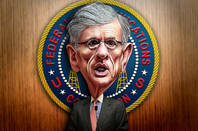## Obama-phone people tried to include Obama-Net free internet in the free telecom plan but GOP killed it
## DNC orders it’s FCC reps to get all of America on high-speed broadband because the more people can surf their own media, the more they vote Democratic
### GOP-Controlled Cable companies go crazy about DNC-Controlled FCC and Google – Declare War on “Information manipulation”#### ALL-OUT BATTLE for the 2016 Elections connects through broadband issue
Networks
![]()
Broadband
American cable giants go bananas after FCC slams broadband rollout
Cynical exercise or uncomfortable truths?

A big fight has broken out between ISPs and their regulator, the Federal Communications Commission (FCC), in the US.
The FCC’s annual Broadband Report will be published shortly, and late Thursday, chairman Tom Wheeler put out a “factsheet” about its main finding: that broadband is “not being deployed in a reasonable and timely fashion to all Americans.”
The report will be discussed at the FCC’s next meeting on January 28 and Wheeler noted in his summary that the regulator is required to “take immediate action” if it makes that finding.
Unsurprisingly, the ISPs are not happy, and USTelecom has rushed out a response. “It would seem that the FCC’s report should carry the headline ‘our policies have failed,'” the industry body complains, “since it concludes that six years after adoption of the national broadband plan, the commission’s actions haven’t produced even so much as a ‘reasonable’ level of broadband deployment.”
It takes issue with the main finding. “No one actually believes that deployment in the United States is unreasonable. Unfortunately, this annual process has become a cynical exercise, one that eschews dispassionate analysis, and is patently intended to reach a predetermined conclusion that will justify a continuing expansion of the agency’s own regulatory reach.”
A history of slow
The rollout of broadband in the US has been a source of tension for more than a decade. The truth is that compared with many other nations, the provision of internet access is far behind, both in terms of speed and reach. It is also significantly more expensive than in comparable nations.
Wheeler lists the factors that led to the conclusion that broadband is not being deployed “in a reasonable and timely fashion,” and they include:
- 34 million Americans don’t have access to the FCC’s benchmark speed of 25Mbps down, 3Mbps up – a benchmark it upped this time last year.
- 39 per cent of the rural population does not have access to fixed broadband – something he says is a “persistent urban-rural digital divide.”
- 41 percent of schools have not met the FCC’s goal of 100 Mbps per 1,000 students/staff.
- Just 9 percent of schools have fiber connections capable of meeting the FCC’s long-term goal of 1Gbps per 1,000 students.
- The US is still far behind other countries, ranking 16th out of 34 developed nations.
Ever since Wheeler pushed net neutrality rules through last year, against the very strong wishes of the telcos, the regulator has been butting heads with those it oversees – somewhat of a change in what has traditionally been quite a cozy relationship.
But this report should not have come as much of a surprise to the industry: when the FCC changed the benchmark speed from 4Mbps to 25Mbps a year ago, Wheeler was quite open about the fact that he felt bandwidth speeds had not kept up with user demands.
An accompanying report at the time argued that rural areas of America were underserved, with 53 per cent of the rural population falling short of the new proposed minimum speed. It also estimated that 55 million people, or 17 per cent of the population, lacked access to the 25/3 standard.
The FCC has crystal clear authority to act when it feels not enough is being done under the one piece of modern telecommunications legislation – the 1996 Telecommunications Act.
Wheeler clearly signalled his intentions 12 months ago (and again last week) and in that time, ISPs have responded by getting broadband to an additional 14 per cent of the rural population and to an additional 21 million Americans.
Wheeler says that’s not enough; the ISPs will beg to differ. Later this month, we will find out what the FCC proposes to do about it. Expect fireworks. ®
Sponsored: Go beyond APM with real-time IT operations analytics
More from The Register

FCC won’t track Do Not Track

GOP senators push FCC to kill support for local broadband

FCC gives small ISPs a pass on open internet rules

FCC under fire over TV, mobile broadband signal interference fears

The Internet Association backs FCC’s muni broadband push

FCC swamped by 2,000+ net neutrality complaints against ISPs
Whitepapers
Magic Quadrant for mobile data protection solutions
Springpath Data Platform with Cisco UCS servers
Incident response capabilities needed
Backing up White River Health System effortlessly
Most read
-

Confirmed: How to stop Windows 10 forcing itself onto PCs – your essential guide
-

Plain cruelty: Boffins flay Linux ransomware for the third time
-

Bloke sues dad who shot down his drone – and why it may decide who owns the skies
-

Was Android moving to OpenJDK really a Google gift to devs?
-

Mozilla warns Firefox fans its SHA-1 ban could bork their security
Spotlight
Smartphone hard, dudes, like it’s the end of the world!
Lovelace at 200: Celebrating the High Priestess to Babbage’s machines
Gartner sees enterprise SSD-HDD revenue crossover in 2017
Invite-only bug bounty criticised for turning up the heat on Tor
SwiftStack CPO: ‘If you take a filesystem and bolt on an object API’… it’s upside down
Fans demand ‘Lemmium’ periodic table tribute
Microservices are not the same thing as components
Ready for DevOps? Time to brush up on The Office and practise ‘culture’
Sponsored links
- Avere Cloud Bursting for Dummies. Download here
- Find & fix SQL Server performance issues. Get 26 free tips
- AliCloud Cloud Computing Services. Global. Reliable. Powered by Intel Xeon processors
- Test Your HPC Apps on AWS with a $250 Quick Start Credit
- Sign up to The Register to receive newsletters and alerts







